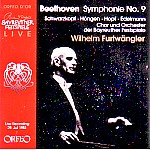A conductor has two jobs: first, to arrive at a conception of the work, and second, to get the players under his direction to realize that conception at the highest level of executional excellence. Although Furtwängler could be great at the former, he was often horrendous at the latter, as his numerous live airchecks attest. He left us one great Beethoven Ninth: the Lucerne Festival performance with the Philharmonia Orchestra from 1954, on Tahra. All of the others suck in one way or another. There is the infamous 1942 “Nazi Ninth” so beloved of his fans, a performance characterized by “danger” (dreadful ensemble, Hitler in the audience) and “extreme tension” (tape overload and atrocious balances); but aside from a handful of other live versions of varying degrees of horribleness in terms of sonics, execution, or both, the best-known of all of his Ninths is this one, from 1951.
The reason it’s so well known is that it was recorded and released by EMI in sound that is substantially superior, smoother, and wider in range compared to what we have here from the original radio broadcast tapes. These are hissy, tinny, and have notably less presence (but louder coughing) than EMI’s latest mastering. Supposedly EMI’s producer Walter Legge did a little splicing from rehearsals to cover some of the disturbances evident in the live performance by this audibly challenged ad-hoc ensemble, but the sonics are so different between the two recordings that they override any other considerations.
As to the performance itself, this is still one of the poorest accounts of the first movement ever recorded. It’s desperately slow–slower even than Klemperer, and far slacker. Opening with shaky ensemble, and painfully flabby in the second subject and much of the development section, it’s a disgrace to the memory of a fine musician. The scherzo goes better, Beethoven’s mechanical rhythmic foundation allowing Furtwängler basically to wind it up and let it run. As the tragically out-of-sync opening of the Adagio shows, he could be most difficult to follow in slow tempos, and this movement is very slow indeed (more than 19 minutes). Furtwängler always gave a transcendent account of the finale, and despite poorly focused choral singing, this is no exception; but it’s certainly not enough to redeem the crudities that disfigure the previous movements. No conductor, with the possible exceptions of Barbirolli and Horenstein, is given more free passes for his obvious failings than Furtwängler. His fans don’t care, but there’s certainly no reason that the rest of us need to put up with so much that would be clearly unacceptable were any other artist’s name attached to the final result.
































